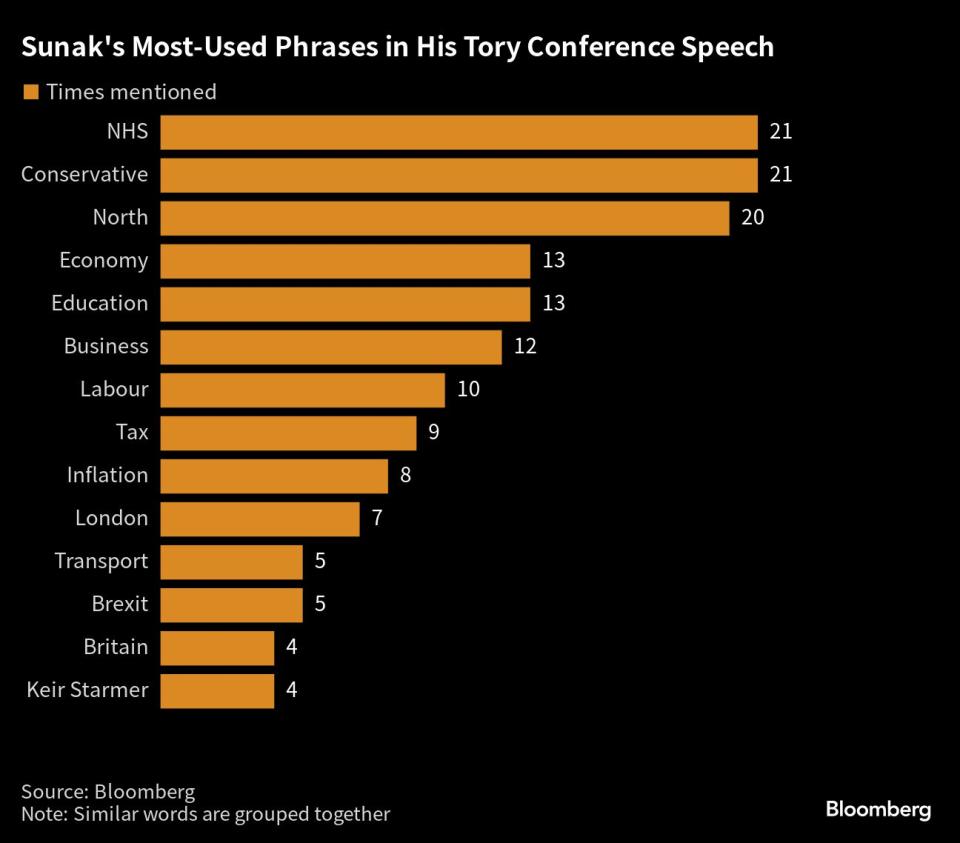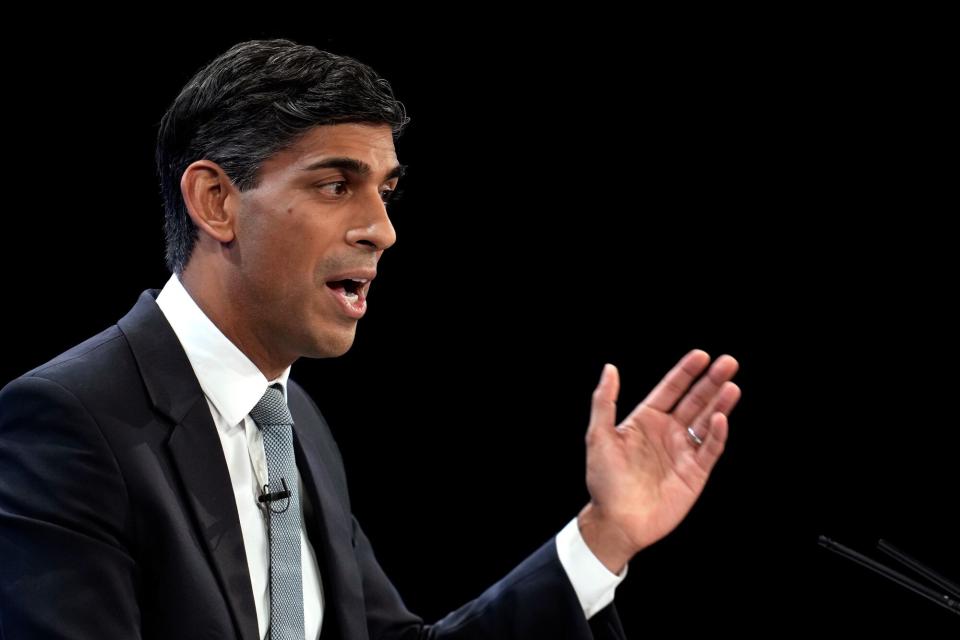Rishi Sunak Starts Reset by Tearing Up Project Championed by Boris Johnson
(Bloomberg) -- Rishi Sunak didn’t just rip up the UK’s flagship rail project on Wednesday. Desperate to be seen as an agent of change after 13 years that have made his Conservative Party deeply unpopular, he took aim at the records of Tory and Labour prime ministers dating back almost to Margaret Thatcher.
Most Read from Bloomberg
Almost Anyone Can Become the House Speaker, Except Donald Trump
Only an Equities Crash Can Rescue the Bond Market, Barclays Says
“We’ve had 30 years of a political system which incentivizes the easy decision, not the right one,” Sunak said in his hour-long keynote speech to the Conservative Party conference, his first as leader. “30 years of vested interests standing in the way of change. 30 years of rhetorical ambition which achieves little more than a short-term headline.”
The attempt to re-frame his administration reflects both the 20-point deficit to the opposition Labour Party in opinion polls and the lack of time to turn it around. He must call a national vote by January 2025 at the latest.
Former Prime Minister Boris Johnson used a similar tactic successfully in 2019, riding his populist brand of retail politics to deliver a thumping election victory. That history poses a problem for Sunak, who was the choice of Conservative Members of Parliament last year but not of fee-paying Tory activists. Voters have also not had their say, and it’s Johnson’s majority in Parliament that the prime minister will be trying to defend.
Far from embracing the legacy Johnson left him, Sunak, 43, is reversing decisions he made, as well as those of occupants of Downing Street long before him. Heading into the conference, he watered down the UK’s green agenda that was a pet project of Johnson. Doing so was also an implicit criticism of Tories Theresa May, David Cameron and Labour’s Gordon Brown.
All were also keen proponents of the HS2 rail project Sunak used his conference speech Wednesday to call time on. Anticipation of the decision to scrap the Birmingham-to-Manchester section — while keeping the southern link to London — dominated the conference and triggered a major backlash from businesses and across the political spectrum. Johnson criticized the move before it was official, but hasn’t commented since Sunak’s speech.
In effect, Sunak is gambling that re-investing funds in alternative transport links will be more popular with voters, and fit better with the government’s promise to level up disadvantaged regions. But it’s risky, and announcing it in Manchester - the planned northern terminus of HS2 - made for bad optics.
“What we’re doing is replacing HS2 with something that’s going to benefit far more people, in far more places, and far quicker,” Sunak told BBC Radio 4 in an interview aired on Thursday. “This is going to transform our country. Everywhere is going to see more money as a result of this investment and it’s going to be the best thing we can do to level up everywhere.”
But Andy Burnham, the Labour mayor of Greater Manchester, accused Sunak of playing politics. “Surely this should be done on a cross-party consultative basis,” he told reporters.
The move also jars with Sunak’s slogan for the conference and likely framing of the election campaign — Long-Term Decisions for a Brighter Future — given construction work on HS2 has already disrupted the lives of thousands of Britons. More broadly, it’s unclear whether Sunak can convince voters he’s not making decisions based on politics, or even that he represents a change.
“The Conservatives have already had 13 years to make the long-term decisions Sunak is arguing are now needed,” Hannah White, director of the Institute for Government think tank, said by phone. “Requiring people to believe that voting for him is voting for change is ambitious.”
Sunak appears to have concluded it’s the only option available. Keir Starmer’s Labour Party, which gets a chance to put forward its own narrative at its annual conference starting Sunday in Liverpool, was a dominant theme in Manchester. House of Commons leader Penny Mordaunt captured the backs-to-the-wall feeling, urging her party to “stand up and fight” Labour, or variations of the phrase, 24 times in her warm-up speech for Sunak.
The prime minister himself called Starmer, 61, “the walking definition of the thirty-year political status quo I am here to end.”
Presenting himself as the candidate of change is “brave” at this point in the political cycle, said Bronwen Maddox, chief executive of the Chatham House think tank. “It’s not as easy as a party that’s in opposition,” she said. “Simply asserting something does not make it the case.”
Yet it’s not only Labour he has eyes on. There’s little expectation of a leadership change before an election, but the jostling to replace him if he loses has already begun, and adds to the pressure. Suella Braverman and Kemi Badenoch have burnished their credentials with crowd-pleasing keynotes, especially on the right of the party.
Ex-premier Liz Truss made an appearance, calling for tax cuts that Sunak said the UK can’t afford now and would trigger further inflation. He’s also battling against the perception that he helped oust Johnson, who was a favorite among Tory activists who wanted Truss — and not Sunak — to succeed him.
That legacy also affects his attempt to re-frame himself with the electorate as representing change. Sunak was Johnson’s finance minister during the coronavirus pandemic, and the decisions he made then have had a major impact on the public finances — and the spending cuts his government has been forced to find since.
“It’s quite hard to prosecute a change argument if you’ve already been in power,” said Helen Thomas, a former adviser to ex-Chancellor George Osborne and CEO of BlondeMoney, a macroeconomic consultancy. “The over-arching issue with this is it’s all too late. The public already know him.”
--With assistance from Ellen Milligan.
(Updates with Sunak comment in eighth paragraph.)
Most Read from Bloomberg Businessweek
Aftermath of an Assassination: Inside the India-Canada Crisis
America’s Factory Boom Brings Billion-Dollar Projects to Tiny Towns
European Real Estate Faces New Pressure as Property Funds Wobble
©2023 Bloomberg L.P.

 Yahoo News
Yahoo News 


